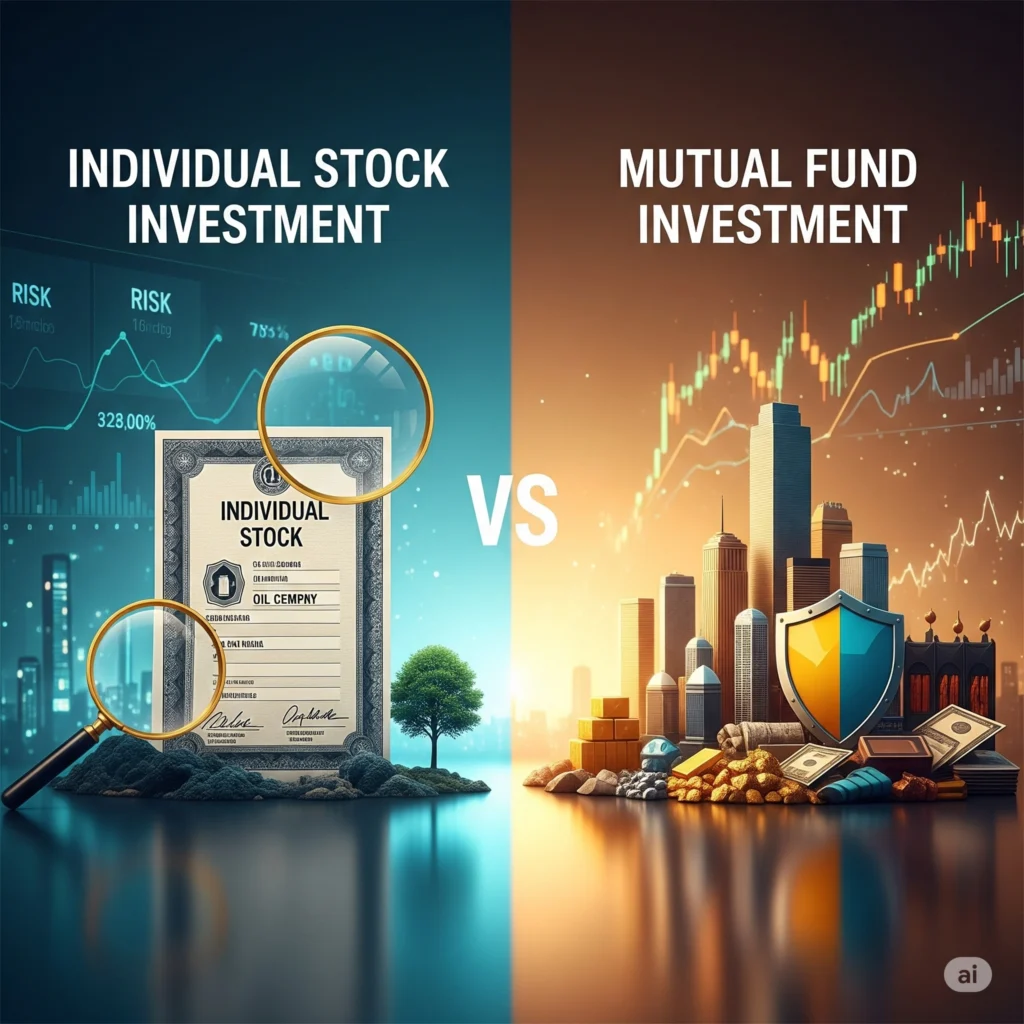Mutual Funds vs Stocks: Which Is Right for You?

73% of Indian regret
- 73% of Indian millennials regret the fact that they did not invest early!
- The first concern for most came with the classic dilemma in their heads:
- “Should I invest in mutual fund schemes or directly in the stock market?”
This is not, and cannot be viewed, as a black-or-white decision in India’s dynamic financial setup of 2025. With skyrocketing inflation, the stock market setting new highs one day only to pare the next, and a slew of fintech innovations claiming our attention-one is left crazy-ass and confused, grasping for any one of the two: ease with mutual funds or the pure thrilling experience of direct stock investing.
Here is a clear comparison of mutual funds and stocks on a side-by-side basis—from potential returns to tax structures and even emotional safety. First-time investors looking for their first series of investments or looking to rebalance an existing portfolio will find this deep dive an arsenal to make an informed decision.
What Are Mutual Funds?

Mutual funds are investment vehicles that collect money from investors for investing in diversified portfolios of equities or debt instruments or both. The investments are managed by either a fund manager or a group of fund managers.
Features of mutual funds:
- Managed by professionals
- Diversify risk
- Two fund types available
- Good for passive investors
- SIP-compatible (start from as low as ₹100/month)
Different kinds of mutual funds include:
- Equity Mutual Funds: These invest primarily in company shares
- Debt Mutual Funds: Involve investing in bonds, debentures, treasury bills, etc.
- Hybrid Funds: Involves a mixture of equity and debt
- Index Funds: Track indices such as Nifty 50, Sensex, etc.
- ELSS (Tax Saving Funds): Offer tax benefits under Section 80C
What Are Stocks?

Stocks mean simple ownership in a company. Buy stocks, and you have acquired ownership interest in that company. From there on, you as a shareholder will be entitled to dividends and capital gains when the company does well.
Characteristics:
- High control over where your money goes
- Potential for massive returns
- High volatility and emotional swings
- Not managed professionally—you’re the boss
- Real-time trading flexibility
Mutual Funds vs Stocks: Detailed Comparison Table
|
Feature |
Mutual Funds |
Stocks |
|
Risk Level |
Moderate (diversified) |
High (market-driven) |
|
Return Potential |
10–15% annually (average equity MF) |
Unlimited (but comes with high risk) |
|
Management Style |
Active/passive fund managers |
Self-managed |
|
Minimum Investment |
As low as ₹100/month (SIP) |
Typically starts around ₹500+ per stock |
|
Liquidity |
High (except for lock-in funds like ELSS) |
Very high (real-time trading) |
|
Fees and Charges |
Expense ratio (0.5% to 2.5%), exit load in some cases |
Brokerage, STT, transaction fees |
|
Taxation |
Depends on type & holding period |
Short-term/long-term capital gains taxes apply |
|
Best For |
Long-term, passive investors |
Active, risk-taking investors |
|
Emotional Involvement |
Low (managed by professionals) |
High (emotion-driven decisions common) |
Which One Performs Better in 2025?

Both have the potential to create wealth, but a stock is not always smooth sailing. Two quick instances are:
Example 1: Mutual Fund SIP (5 Years)
- Investing ₹5,000/month in a Nifty 50 Index Fund (10% CAGR):
- Total Investment: ₹3 Lakhs → Final Corpus: ₹3.9 Lakhs
Example 2: Individual Stocks
- An investment of ₹50,000 on a top IT stock back in 2020 (say TCS) → increase of 100% by 2025:
- If you picked the right stock, then final value: ₹1 Lakh
Conclusion: Stocks may outperform but are highly volatile and require skills. Institutional mutual funds give you a smooth compounding over time.
(Mutual funds that do-it-all pros & cons.)
Mutual Fund Advantages:
- Managed by professionals
- Automatically diversified
- Great for a novice, and goal-based investing
- SIP option to inculcate discipline
- Transparent and regulated
Mutual Fund Disadvantages:
- Expense ratio will eat returns
- Stock selections; No rights for a fund investor
- Past performance is no guarantee for future performance
- Very little flexibility
- Some funds have lock-in periods (e.g., ELSS: 3 years)
Stocks Pros:
- Give complete control to the investor
- Potential for high short-term gains
- Go ahead and buy and sell in real time
- Dividends + Capital appreciation
- No-fund-manager-dependency
Stocks Cons:
- Knowledge and time needed
- Finally, an emotional decision
- The second is to be volatile and unpredictable
- The higher taxes arise when you are selling from much frequency
- More chances of being lost for an uninformed investor

Which One Is Right for You?
You would go for Mutual Funds if:
- You are a beginner or very casual
- Settled with a job, no time to track markets every day
- Considering long-term goals focus (such as retirement, house)
- Likely to invest through SIPs to inculcate financial discipline
- Want a worry-free investment with minimal upkeep
You would go for Stocks if:
- You like researching markets and trends
- You can take on the financial risk and emotional swings
- You have an appetite somewhere from medium-to-high-risk.
- You want active wealth creation and can give some time on a daily basis.
- You want to delve into intraday or short-term trading.
Why Not Both? The 70-30 Strategy
The year 2025 is said to be marked by most modern financial advisors recommending some form of hybrid investment technique balancing the blessings of both worlds.
In the portfolio she presented:
- 70% in mutual funds (systematic investment plan in index + hybrid + ELSS)
- 30% in stocks chosen prudently (blue chips + growth promoters)
They rebalance portfolios quarterly to make sure they are on track the basis of financial goals.